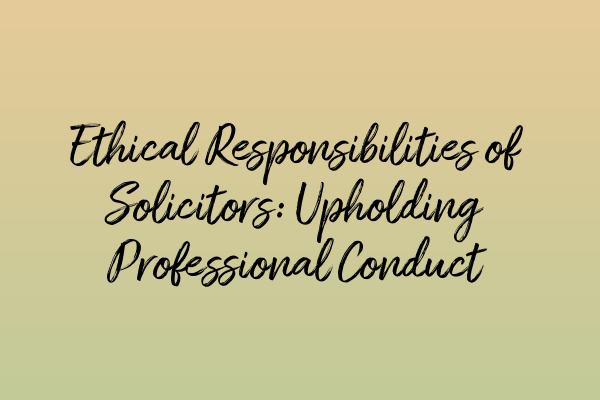Ethical Responsibilities of Solicitors: Upholding Professional Conduct
As solicitors, we have the privilege and responsibility to serve as advocates of justice. Our profession is rooted in the principles of ethics and professional conduct, which guide us in our interactions with clients, colleagues, and the legal system as a whole. In this blog post, we will explore the ethical responsibilities of solicitors and discuss the importance of upholding professional standards.
What are Ethical Responsibilities?
Ethical responsibilities are the obligations that solicitors have towards their clients, the legal profession, and society at large. These responsibilities go beyond simply abiding by the law; they encompass a commitment to integrity, honesty, and fairness in all aspects of our professional practice.
As solicitors, we are expected to act in the best interests of our clients while also upholding the principles of justice. This means providing competent and diligent representation, maintaining client confidentiality, and avoiding conflicts of interest. Additionally, we have a duty to respect the rule of law, promote equal access to justice, and uphold the reputation of the legal profession.
Importance of Upholding Professional Conduct
Upholding professional conduct is of paramount importance as it not only ensures the integrity of the legal system but also safeguards the rights and interests of our clients. By adhering to ethical standards, solicitors instill trust and confidence in their clients, who rely on us to navigate complex legal matters and seek justice.
Furthermore, upholding professional conduct is essential for maintaining the reputation of the legal profession. By demonstrating our commitment to ethical behavior, we contribute to the public’s perception of solicitors as trustworthy, reliable, and dedicated professionals.
However, the importance of upholding professional conduct goes beyond individual solicitors and their clients. It extends to the legal system as a whole, as well as society at large. By adhering to ethical responsibilities, solicitors play a crucial role in ensuring access to justice, promoting equality, and upholding the rule of law.
Challenges and Dilemmas
As solicitors, we often face various challenges and dilemmas that test our ethical responsibilities. For example, in criminal defense cases, we may be confronted with ethical dilemmas regarding confidentiality and the duty to disclose information that may be harmful to our clients’ defense.
In such situations, it is essential to navigate these challenges with integrity and professionalism. Seeking guidance from professional bodies, such as the Solicitors Regulation Authority (SRA), can provide valuable insights and support in making difficult decisions while upholding ethical responsibilities.
Resources and Support
As solicitors, it is our duty to stay informed about the latest developments in legal ethics and professional conduct. The SRA provides comprehensive guidelines and resources that can help us navigate ethical dilemmas and uphold our responsibilities.
In addition to professional bodies, networking and engaging with fellow solicitors can also provide valuable support and insights. By sharing experiences and best practices, we can collectively strengthen the profession and ensure the highest standards of ethical conduct.
Conclusion
Upholding professional conduct is not just a requirement; it is a fundamental aspect of our role as solicitors. By adhering to ethical responsibilities, we actively contribute to the credibility and integrity of the legal profession. Embracing our ethical obligations not only benefits our clients and the legal system but also allows us to fulfill our duty as advocates of justice.
For more information on related topics, please refer to the following articles:
- Private Prosecutions: Exploring Non-Governmental Prosecutions in Criminal Cases
- Ethical Challenges in Criminal Defence: Navigating Dilemmas
- Understanding Drug-related Offences: Laws and Penalties in the UK
- Magistrates’ Court vs Crown Court: Different Paths in Criminal Proceedings
- Criminal Defence Strategies: Expert Approaches to Protecting Clients’ Interests


Leave a Reply